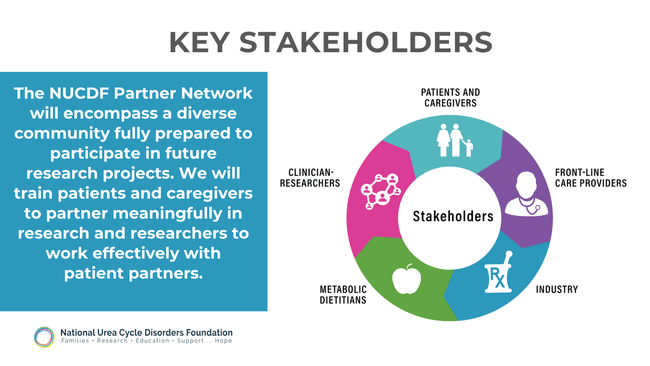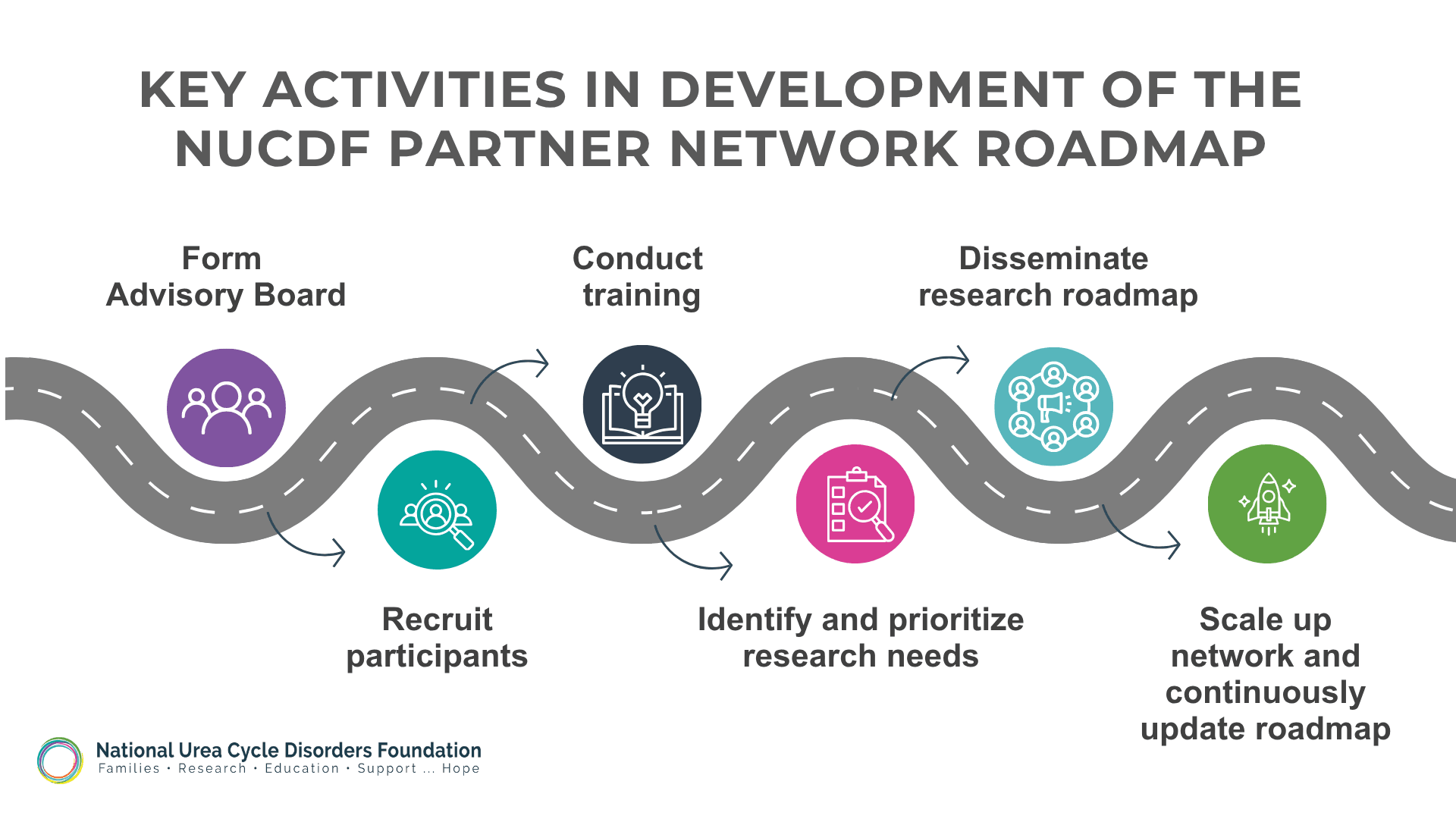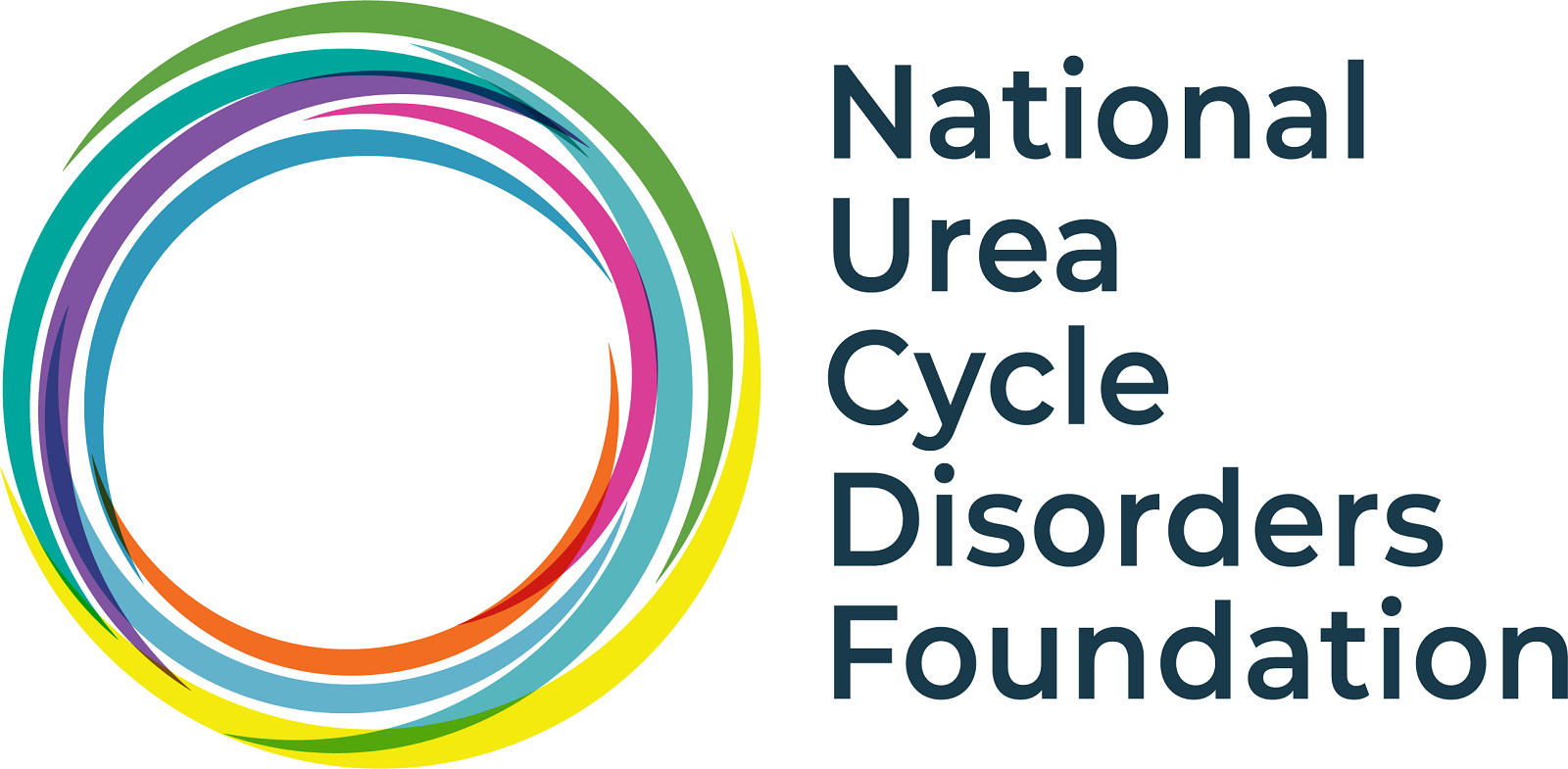
Project News
NUCDF to Build Network, Create Roadmap for Future Research in Urea Cycle Disorders
June 18, 2025—NUCDF launches a two-year national project to establish the multistakeholder NUCDF Partner Network and develop a roadmap for future research in urea cycle disorders (UCDs). The project is funded through the Eugene Washington PCORI Engagement Award Program, an initiative of the Patient-Centered Outcomes Research Institute (PCORI). Read more
Project Overview
Building Capacity for Patient-Centered Comparative Effectiveness Research on Urea Cycle Disorders
Urea cycle disorders (UCDs) are eight related genetic disorders of protein metabolism that can lead to coma, brain damage and death. Three decades ago, a UCD diagnosis meant near-certain fatal outcomes in infancy. If patients survived, they faced likely brain damage and high levels of morbidity into childhood. Today, thanks to decades of research advancements, a UCD diagnosis has been transformed into a complex but manageable chronic illness for many patients, allowing them to achieve improved health outcomes and survive into adulthood.
The UCD community now finds itself at a critical research juncture. While medical advances have led to multiple treatments, there has been little comparative effectiveness research (CER), leaving patients and clinicians with insufficient data to guide healthcare decisions. Research priorities are not always aligned with the emerging needs of patients, who are living longer than ever before and facing new challenges. Lack of connectivity among diverse stakeholder groups and multiple leadership transitions have created gaps in research planning. Our project will address these gaps—lack of CER, evolving patient needs, and insufficient connectivity among stakeholders—to build our capacity for broader, ongoing, and sustainable input from the patient community and other UCD stakeholders.
Motivation
There is a critical need to develop a sustainable infrastructure for multi-stakeholder engagement in UCD research that can advance patient-centered CER. This infrastructure must empower the UCD community to identify research gaps, prioritize research needs, and ensure that patients and other stakeholders have a meaningful voice in setting the future research agenda. Our organization, the National Urea Cycle Disorders Foundation (NUCDF), is the leading patient advocacy organization for UCDs. We are uniquely suited to build capacity for stakeholders to engage in patient-centered CER: we have longstanding relationships with UCD researchers, we are deeply connected to the UCD patient and caregiver community, and we have significant experience collaborating on research grants.

Goals and Objectives
Our project will establish the NUCDF Partner Network, a group of diverse UCD stakeholders— including patients and caregivers, clinician-researchers, front-line providers, metabolic dietitians, and industry representatives—who will be trained in patient-centered CER. We want to empower our community to work together effectively, leveraging the advantages of team science, diverse perspectives, and disparate expertise to benefit patients and caregivers. We plan to expand this network into one that is sustainable: able to address complex questions and enhance the quality of research, delivering the answers patients need to improve their outcomes and quality of life.
Our overall goal is to build the UCD community’s capacity to engage in patient-centered outcomes research (PCOR) and to develop a roadmap for patient-centered research that can support future CER. We will accomplish this through five main objectives. We will establish an Advisory Board to guide the project; recruit a diverse group of UCD stakeholders to join our Partner Network; develop customized training materials and train the NUCDF Partner Network in patient-centered CER; identify and prioritize the research needs of the UCD community through focus groups and subsequent surveys; and disseminate the results of our work to a broad group of stakeholders, including patient partners, investigators, and the wider UCD community.
Activities
The Advisory Board will meet quarterly to guide all aspects of the project. They will help to recruit a diverse group of patients, clinician-researchers, front-line providers, metabolic dietitians, and industry representatives to join the NUCDF Partner Network. Partner Network members will attend a virtual orientation session and receive training in patient-centered CER. A series of focus groups will be held to elucidate the CER-related research needs of each stakeholder group to help develop a roadmap for patient-centered CER. A brief survey will be distributed to the entire partner network to prioritize needs. To ensure that stakeholder feedback is incorporated at every stage of this project, the draft roadmap will be shared with the NUCDF Partner Network for comment. Key personnel will revise the roadmap based on this input, and the AB will review the final draft prior to finalization.

Deliverables
Our primary deliverable is a roadmap for patient-centered CER in the UCD context; a secondary deliverable is a scientific report of our results, to be published in a scientific journal. We will also create plain-language versions of our results for dissemination to patients and other stakeholders. Other deliverables–such as a Town Hall session to share results and a press release–are detailed in the Activities and Deliverables table.
Outcomes
By the end of the project period, we will have created the NUCDF Partner Network, a diverse group of stakeholders trained in patient-centered CER; developed a patient-prioritized research agenda and stakeholder-informed roadmap to guide our journey toward CER; and shared our findings with the research and patient communities. From 0-2 years post-project, we will have a sustainable infrastructure for patient-centered CER with NUCDF as its hub. The NUCDF Partner Network will be meaningfully engaged in launching CER projects that reflect the priorities of the patient community. We will also have an AB accustomed to working together effectively as a team. From 3+ years post-project, our Partner Network will be increasingly engaged in defining research questions and participating in studies. Ideal long-term outcomes will be research projects that meaningfully address patient questions and improve health outcomes.
Patient and Stakeholder Engagement Plan
Stakeholders to be involved in the project include patients and caregivers: those with lived experience of UCDs. We include patients and caregivers in a single group because UCD patients require complex care from birth and may have significant intellectual disabilities. Clinician-researchers include members of the Urea Cycle Disorders Consortium, our research partner, and additional experts such as international researchers and specialists in areas like biostatistics, CER, patient engagement, and learning health networks. Metabolic dietitians have been identified as a unique audience because they are essential members of UCD healthcare teams but have not typically played a major role in setting the UCD research agenda; front-line providers are those who first diagnose UCD patients and often coordinate their day-to-day care, such as pediatricians, primary care providers, emergency room personnel, and nurses. Industry representatives develop and distribute products and services for people with UCDs and lead the commercialization of novel therapies. All five stakeholder groups identified above will be represented in both our project’s Advisory Board and in the NUCDF Partner Network. Advisory board members will attend quarterly, two-hour meetings and help guide all aspects of the project. Partner Network members will engage in the project during orientation, training, focus groups, and surveys; they will also assist in dissemination activities.
Project Collaborators
NUCDF staff will lead the project. Other key personnel include Dr. Anna Wexler, a UCD caregiver and professor of medical ethics at the University of Pennsylvania with significant qualitative research expertise. A network of consultants will ensure our robust research expertise. These include leading UCD researchers from the Urea Cycle Disorders Consortium (Andrea Gropman, MD of St. Jude) and Sandesh C.S. Nagamani, MD (Baylor) along with engagement experts George Mazariegos, MD from the Starzl Network and Tracy Hart, Chief Executive Officer of the OI Foundation. A range of other experts will also be engaged in our project Advisory Board.
